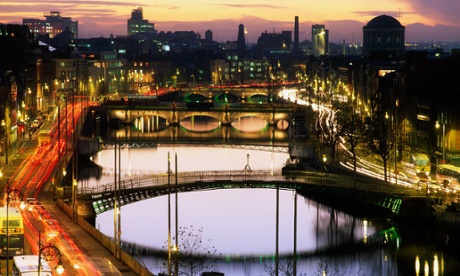
This week’s best city stories explore Dublin’s plans to ban private cars from its city centre, discuss the impact of bus rapid transit (BRT) systems on cities in Pakistan and look at designs to transform Honolulu’s buses into mobile homeless shelters. We’d love to hear your responses to these stories, and any others you’ve read recently, both on Guardian Cities and elsewhere. Just share your thoughts in the comments below.
A car-free Dublin?
As we recently explored, some cities, especially in Europe, are starting to discourage or even ban private car use. Now Dublin is poised to become the latest city to join the fray. Next City reports that Dublin’s City Council and Ireland’s National Transport Authority have proposed to ban private cars in sections of the city centre, in order to ease traffic problems and make Dublin a more pleasant place to live. The reduction of cars will also free up room for a new tram line, planned for 2017.
Buses in Pakistan
As the Washington Post reports, a new 14-mile bus rapid transit (BRT) system opened in Pakistan this month, connecting the twin cities of Islamabad and Rawalpindi. It follows the success of the similar bus system in Lahore, which started operation in 2013. Pakistan has lacked efficient public transport in the past; these air-conditioned buses in dedicated lanes are designed to make urban travel easier and quicker. The systems are also heavily subsidised, to provide an affordable transport option.
“The new service is offering a window into how transformational mass transit can be for the poor and middle classes,” writes Tim Craig. The rapid bus systems have not been without controversy, however: several politicians have argued that the money could have been spent on education, health care or social services instead. Nevertheless, a new one is planned for Karachi.
Helping Honolulu’s homeless
A new plan for “mobile shelters” aims to provide assistance to the growing population of homeless in Honolulu. Taking inspiration from a San Francisco effort to turn old city buses into shower units for the homeless, the local government of Hawaii’s capital realised they, too, had decommissioned city buses they could reus.
As Fast Co Exist explains, a local architecture firm has volunteered its services to redesign the buses as mobile homeless shelters. The shelters would offer not only sleeping and showering facilities, but also adapt to serve as daytime social, cultural and health hubs.
Vertical citizenship
CityLab and the National Film Board of Canada have launched a new digital interactive, Universe Within, a documentary project that reveals the lives of residents of high-rises – “vertical citizens” – around the world, from Guangzhou to Mumbai to New York. “As cities reach for the sky, the high-rise building becomes a metaphor for the urban planet,” the site explains. “Trapped in our apartments, how do we engage with our loved ones over the worldwide web? How has it rewired our brains and our relationships?”
London’s petrification
In the Financial Times, Edwin Heathcote writes about the role of social housing in supporting better, more diverse cities. In response to Brandon Lewis’ call last week for the demolition of London’s council estates in pursuit of denser mixed developments to address the housing crisis, Heathcote explores the history of social housing in London – and notes that the city’s high-end properties are not under a similar threat in the name of densification.
“The plan to rid London of its central social housing is short-sighted,” Heathcote argues. “It would rob the streetscapes of the bustle of everyday life and accelerate a slide into an empty vehicle for investment — the difference between a city that has the flexibility to adapt and absorb change, and one that stagnates as a luxury enclave.”

